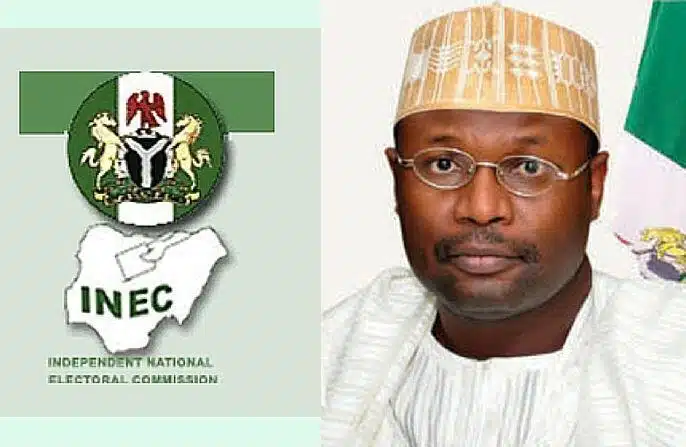Professor Mahmood Yakubu has confirmed that his decision to step down as head of the Independent National Electoral Commission (INEC) was to create room for a new chairman to be appointed.
The New Daily Prime earlier reported that Yakubu resigned on Tuesday and handed over to May Agbamuche-Mbu, a national commissioner, as the acting chairman.
This transition ceremony took place at the INEC headquarters in Abuja during a scheduled consultation meeting with all Resident Electoral Commissioners (RECs).
READ ALSO: INEC boss Yakubu resigns after 10yrs, hands over to acting chair
Yakubu added that by stepping aside now, he hopes to give the incoming chairperson sufficient time to settle into the position and get a head start on managing the commission’s electoral tasks and upcoming activities.
He added that he understands the significant challenges that lie ahead, especially with only a few weeks remaining in his own term.
He invoked his constitutional prerogative, citing Section 36, Subsections 1 and 2 of the 1999 Constitution, as amended, for his decision.
He noted that after consulting with other national commissioners, he designated Agbamuche-Mbu, the longest-serving commissioner by appointment date, to take over temporarily.
He stressed that this timing would allow the new leader to promptly engage with the massive undertaking of managing elections and related activities in what he described as Africa’s most complex environment in terms of demographics and logistics.
READ ALSO: Tinubu accepts Yakubu’s departure, honours him with CON
He appreciated the outstanding professional relationships he shared with both the commission members and the RECs, and during his tenure, which began in 2015, he worked alongside 24 national commissioners and 67 RECs.
He also gave special thanks to the successive secretaries and the dedicated INEC staff across the nation.
Yakubu recalled that through their collective effort, they innovated and handled the commission’s demanding responsibilities, often pushing the organisation to its limits.
He also appreciated external bodies, including the National Assembly, political parties, the National Peace Committee, civil society groups, the media, labour unions, security agencies, the National Youth Service Corps, and various other stakeholders.
He reserved his deepest thanks for the Nigerian public, whose feedback and constructive criticism fueled their commitment rather than discouraging them.
He pointed to major accomplishments under his leadership, including consolidating the biometric voter register and moving many of INEC’s paper-based activities to digital platforms and applications.
These digital innovations streamlined processes like candidate nominations, the submission of party agents, the accreditation of observers and media, voter accreditation, and the entire result management system.
Supported by development partners, INEC also rolled out various technologies to enhance election management in areas such as finding election facilities, managing collation/returning officers, conducting virtual staff training, overseeing political party finances, and monitoring elections using the Election Monitoring and Support Centre (EMSC).
Yakubu acknowledged that more work remains despite the significant strides made during his term.
He confirmed that the commission is preparing for several upcoming off-cycle elections: the Anambra governorship election in November, the FCT Area Council election, and the Ekiti and Osun governorship elections in 2026.
Ahead of the elections, INEC has commenced work on key preparations for the 2027 general elections, pending the passage of a new Electoral Act currently before the National Assembly.
Yakubu noted that the expected electoral reforms would require a subsequent review of INEC’s regulations, guidelines, and manuals.
Beyond these legislative adjustments, the commission still needs to clean up the voters’ register, re-evaluate the location of some polling units and how voters are assigned to them, and manage the complex process of party primaries.
He reminded the audience that in the last general election, the commission processed over 20,000 candidate nominations.
Furthermore, the monumental logistical task of purchasing, producing, and transporting vast quantities of election materials via road, air, and sea remains a constant challenge.
In her acceptance speech, Agbamuche-Mbu, lauded Yakubu for the high standards he established during his tenure.
She acknowledged his significant contributions, achievements, and dedication to serving the country with distinction.
She assured Yakubu that the commission is committed to upholding and maintaining the standards he has set.
READ ALSO: FG renames University of Abuja after Yakubu Gowon
Agbamuche-Mbu pledged to maintain the commission’s integrity and vowed to work with utmost professionalism, dedication, and unity alongside the commissioners, RECs, directors, and staff nationwide.
She also committed to cooperating with all stakeholders to ensure INEC’s continued growth and success.
The handover ceremony ended with Yakubu presenting Agbamuche-Mbu with Election Management in Nigeria 2015-2025, a compendium of all activities under his watch, and Electoral Technology 2015-2025.
He then signed the official handover notes and presented them to Agbamuche-Mbu.



